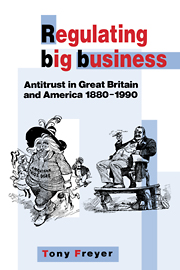Book contents
- Frontmatter
- Contents
- Preface
- Introduction
- 1 The response to big business: the formative era, 1880–1914
- 2 The divergence of economic thought
- 3 The political response
- 4 The courts respond to big business
- 5 The impact of World War I, 1914–1921
- 6 Tentative convergence, 1921–1948
- 7 A British antimonopoly policy emerges, 1940–1948
- 8 Uneven convergence since World War II
- Conclusion
- Notes
- Index
3 - The political response
Published online by Cambridge University Press: 21 January 2010
- Frontmatter
- Contents
- Preface
- Introduction
- 1 The response to big business: the formative era, 1880–1914
- 2 The divergence of economic thought
- 3 The political response
- 4 The courts respond to big business
- 5 The impact of World War I, 1914–1921
- 6 Tentative convergence, 1921–1948
- 7 A British antimonopoly policy emerges, 1940–1948
- 8 Uneven convergence since World War II
- Conclusion
- Notes
- Index
Summary
The interplay of politics and market relations shaped a different course of business development in Britain and America. Parliament's supremacy, changing interest-group pressures within the major parties, an effective civil service, and the judiciary's relative passivity constituted a stable political order in which the social-class system and labor's struggle paradoxically sustained the Free Trade consensus favoring noninterference with anticompetitive combinations. No significant institutional constraints impeded the family firm's preference for loose over tight business structures. Consequently, the scale of the merger wave was more modest and, the regulation of railways and shipping notwithstanding, business selfregulation took hold. In America before the mid–1890s, by contrast, the insecurity of small business, the tension between republican values and private rights, federalism, and judicial supremacy encouraged divergent legal rules which influenced the ambiguous provisions of the Sherman Act. The ambivalence of state common law and legislative measures, which the Supreme Court's 1895 and 1897 decisions reinforced, facilitated the larger merger wave. This transformation exacerbated fears of corruption and the demise of small enterprise; but it also strengthened Americans’ yearning for government action to prevent the abuse of bad and preserve the benefits of good large-scale corporations. As a result of the conflict between morals and economics the Court established the rule of reason and after the election of 1912 the federal government bureaucratized antitrust policymaking.
British and American law makers responded to the depressed economic conditions of the 1880s and early nineties unevenly. Revising old doctrines, the judges of both countries gradually adopted a rule of reasonableness, indicating the common need for a more flexible legal standard.
- Type
- Chapter
- Information
- Regulating Big BusinessAntitrust in Great Britain and America, 1880–1990, pp. 76 - 120Publisher: Cambridge University PressPrint publication year: 1992
- 1
- Cited by



